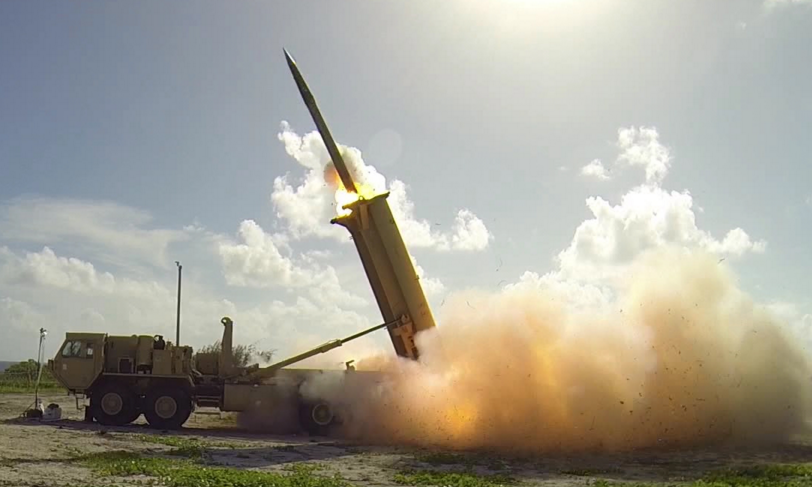Trump Becomes President—Because Bombing

Zakaria to Trump: No need to go to a “pesky Congress”
“I think Donald Trump became president of the United States. I think this was actually a big moment…. President Trump recognized that the president of the United States does have to act to enforce international norms, does have to have this broader moral and political purpose. President Trump realized, as every president has for many decades now, that presidents always believe they have inherent legal authority as commander in chief. And they don’t need to go to a pesky Congress every time they want military force.”
—CNN host Fareed Zakaria when asked about the significance of Trump’s airstrikes on Syria (New Day, 4/7/17)
Violence Makes Editors Happy
After Donald Trump ordered airstrikes on a Syrian government airbase, corporate media’s response was virtually unanimous: Over the next two days, the New York Times, Washington Post, USA Today, Wall Street Journal and New York Daily News offered 18 opinion pieces either praising the strikes or criticizing them for not going far enough—and not a single one opposed (FAIR.org, 4/7/17). Out of the top 100 US newspapers, only one ran an editorial against the attacks: The Houston Chronicle (4/7/17), which condemned the lack of a “legislative framework.”
For Friedman, Geopolitics Tops Genocide

ISIS massacring captured Syrian soldiers. For Friedman, ISIS’s bloodthirstiness is a feature, not a bug.
In 2015, New York Times columnist Thomas Friedman (3/18/15) wondered: “Should we be arming ISIS?”—presenting the apocalyptic terrorist group as “the last Sunni bulwark to a total Iranian takeover of Iraq.” The next year, both the UN and the US State Department charged ISIS with genocide against Yazidis and other minority groups (New York Times, 6/16/16). Undaunted, Friedman (4/12/17) is now arguing that the United States should
back off fighting territorial ISIS in Syria…. Trump should let ISIS be Assad’s, Iran’s, Hezbollah’s and Russia’s headache — the same way we encouraged the mujahedeen fighters to bleed Russia in Afghanistan.
Friedman didn’t mention that the war provoked by US support for Afghan rebels resulted in the deaths of at least half a million civilians, or that it led directly to the rise of Al Qaeda, which killed 3,000 people on September 11, 2001.
Impossible to Verify—or to Resist Reprinting
A New York Times report (4/24/17) on North Korea contained this money shot: “A growing body of expert studies and classified intelligence reports …conclude the country is capable of producing a nuclear bomb every six or seven weeks.” The sourcing could hardly be vaguer, and the very next sentence emphasized that the claim was “impossible to verify”—perhaps in recognition of the fact that the Times’ credulous handling of intelligence reports on enemy WMDs hasn’t always worked out well. That didn’t stop numerous outlets—like Yahoo News (4/25/17), UPI (4/25/17) and the Daily Caller (4/25/17)—from running with the Times’ impossible-to-verify scoop. Vox (4/25/17) put it: “Here is the most frightening thing you’ll read all day: Growing numbers of US intelligence officials believe North Korea can produce a new nuclear bomb every six or seven weeks.” Personally, we find the media willingness to echo unverifiable, inflammatory claims from unnamed experts to be more frightening.
Think Tank Licks the Hand That Feeds

The THAAD anti-missile system sure is great, say analysts whose salaries are partly paid for by THAAD’s manufacturer. (photo: DoD/Lockheed Martin)
The Terminal High Altitude Area Defense (THAAD) anti-missile system is “exactly the kind of thing that you would want,” the Center for Strategic and International Studies’ Thomas Karako told Wired (4/23/17). It has “a perfect intercept record in trials to date,” he told the Christian Science Monitor (7/21/16). Deploying THAAD is “a ‘natural consequence’ of an evolving threat from North Korea,” Karako’s CSIS colleague Bonnie Glaser said to Voice of America (3/22/17). “I don’t think it would be prudent” for a new South Korean government to withdraw THAAD, CSIS’s Victor Cha told Reuters (3/10/17).
What all these reports have in common is that none of them mention that CSIS, the think tank that provided all these glowing endorsements of THAAD, is heavily funded by Lockheed Martin, the chief manufacturer of the missile defense system (FAIR.org, 5/8/17).
At Reuters, ‘Not Refuting’ Is Believing
“Top US General in Afghanistan Sees Russia Sending Weapons to Taliban” was Reuters’ headline over a April 25 story. When you read the actual story, this turned out to be a reference to Gen. John Nicholson’s answer to a question about hypothetical Russian weapons in Afghanistan: “Oh no, I am not refuting that.” Reuters wrote that Nicholson’s no-comment comments “are among the strongest suggestions yet that Moscow is providing arms to the Taliban.” If someone not disproving your story is one of your strongest pieces of evidence, then your evidence is not very strong, is it?
Nice Work if You Can Get It

Andrew Cuomo’s lucrative memoir
New York Gov. Andrew Cuomo has been paid $783,000 in royalties for a memoir that’s sold 3,200 copies—that’s $245 a copy, as the Buffalo News (4/18/17) pointed out. Sounds like a bad deal for Rupert Murdoch-–owned Harper Collins—unless you factor in the tax breaks for Murdoch-owned businesses that Cuomo has pushed for (International Business Times, 2/25/15).
Journalism Disrupts ‘Governmental Processes’
West Virginia state police arrested Dan Heyman, a veteran reporter with Public News Service, for repeatedly asking Health and Human Services Secretary Tom Price whether being a target of domestic violence would be considered a “pre-existing condition,” allowing health insurance to be denied, under the new Republican healthcare bill. The charge: “willful disruption of governmental processes.”
